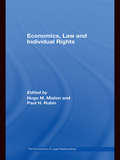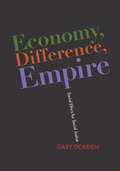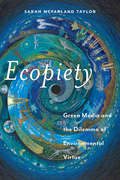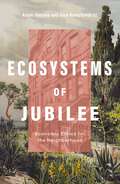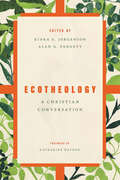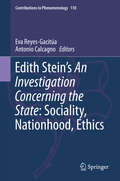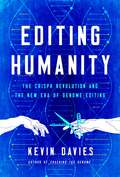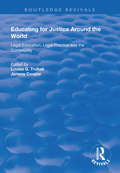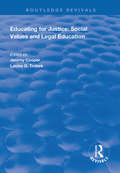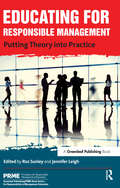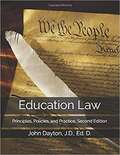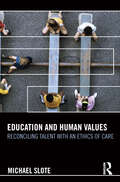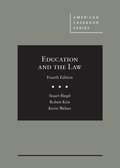- Table View
- List View
Economics, Governance, And Politics In The Wine Market
by Davide Gaeta Paola CorsinoviThe global wine industry is a continually modifying market impacted by financing, culture, and politics. Economics, Governance, and Politics in the Wine Market analyzes recent developments in European Agriculture policies on wine legislation and market trend orientation between political power and market structure.
Economics, Law and Individual Rights (The\economics Of Legal Relationships Ser.)
by Hugo M. Mialon Paul H. RubinThis is the first book to examine individual rights from an economic perspective, collecting together leading articles in this emerging area of interest and showing the vibrant and expanding scholarship that relates them. Areas covered includeThe implications of constitutional protections of individual rights and freedoms, including freedom of spee
Economy, Difference, Empire: Social Ethics for Social Justice
by Gary DorrienSourcing the major traditions of progressive Christian social ethics-social gospel liberalism, Niebuhrian realism, and liberation theology-Gary Dorrien argues for the social-ethical necessity of social justice politics. In carefully reasoned essays, he focuses on three broad subjects: the ethics and politics of economic justice; racial and gender justice; and anti-militarism, and makes a constructive case for economic democracy, a liberationist understanding of racial and gender justice, and an anti-imperial form of liberal internationalism. In Dorrien's view, the three major discourse traditions of progressive Christian social ethics share a fundamental commitment to transform the structures of society in the direction of social justice. His reflections on these topics feature extensive and innovative analyses of major figures, such as Walter Rauschenbusch, Reinhold Niebuhr, James Burnham, Norman Thomas, and Michael Harrington, and contemporary intellectuals, such as Rosemary R. Ruether, Katie Cannon, Gregory Baum, and Cornel West. Dorrien also weaves his personal experiences into his narrative, especially his involvement in social justice movements. The volume features a special chapter on Dorrien's published work during the 2008 presidential campaign and historic candidacy of Barack Obama.
Economy, Difference, Empire: Social Ethics for Social Justice (Columbia Series on Religion and Politics)
by Gary DorrienSourcing the major traditions of progressive Christian social ethics-social gospel liberalism, Niebuhrian realism, and liberation theology-Gary Dorrien argues for the social-ethical necessity of social justice politics. In carefully reasoned essays, he focuses on three subjects: the ethics and politics of economic justice, racial and gender justice, and antimilitarism, making a constructive case for economic democracy, along with a liberationist understanding of racial and gender justice and an anti-imperial form of liberal internationalism. In Dorrien's view, the three major discourse traditions of progressive Christian social ethics share a fundamental commitment to transform the structures of society in the direction of social justice. His reflections on these topics feature innovative analyses of major figures, such as Walter Rauschenbusch, Reinhold Niebuhr, James Burnham, Norman Thomas, and Michael Harrington, and an extensive engagement with contemporary intellectuals, such as Rosemary R. Ruether, Katie Cannon, Gregory Baum, and Cornel West. Dorrien also weaves his personal experiences into his narrative, especially his involvement in social justice movements. He includes a special chapter on the 2008 presidential campaign and the historic candidacy of Barack Obama.
Ecophenomenology and the Environmental Crisis in the Sundarbans: Towards a Community-Based Ethic (Routledge Explorations in Environmental Studies)
by Kalpita Bhar PaulThis book offers a philosophical analysis of the environmental crisis in the Indian Sundarbans, drawing upon phenomenological narratives. It nuances the present understanding of the crisis by introducing plurality in our metaphysical understanding of the environment and epistemological understanding of the human–environment relationship.Contemporary research on the Sundarbans mainly focuses on the impending threat of climate change, natural disasters, as well as increasing human–animal conflict, conservation, and forest access debates, while scholarly works have mostly used environmental impact assessments to offer technocratic solutions that prioritize a particular type of human–environment relationship characterized by an "anticipation of ruin." Rather than rushing to find solutions, I embark on a journey to unpack the meaning of crisis through phenomenological narratives of human–environment relationships. A deep dive into the human–environment relationship through an intentional engagement with the work-worlds of islanders, the formation of a more-than-human community is revealed, giving rise to community-based ethic that transcends the poverty of thought and imagination in comprehending the crisis of the Indian Sundarbans. This new ethical framework emphasizes the co-emergence of self-consciousness and eco-consciousness, serving as a moral impetus for individuals to act ethically towards the environment. This approach impels us to rethink what the Sundarbans is, how the crisis gets manifested to the inlanders and outsiders, and what kind of procedural changes are required to protect the Sundarbans as a living ecosystem instead of a natural museum.The book’s phenomenological depth and engaged philosophical framework will elicit deep interest from within academia and among practitioners who are working in environmental studies, philosophy, human ecology, and island studies. The convergence of conceptual understandings and field narratives will also draw the interest of research students working in correlated fields.
Ecopiety: Green Media and the Dilemma of Environmental Virtue (Religion and Social Transformation #1)
by Sarah McFarland TaylorTackles a human problem we all share―the fate of the earth and our role in its future Confident that your personal good deeds of environmental virtue will save the earth? The stories we encounter about the environment in popular culture too often promote an imagined moral economy, assuring us that tiny acts of voluntary personal piety, such as recycling a coffee cup, or purchasing green consumer items, can offset our destructive habits. No need to make any fundamental structural changes. The trick is simply for the consumer to buy the right things and shop our way to a greener future.It’s time for a reality check. Ecopiety offers an absorbing examination of the intersections of environmental sensibilities, contemporary expressions of piety and devotion, and American popular culture. Ranging from portrayals of environmental sin and virtue such as the eco-pious depiction of Christian Grey in Fifty Shades of Grey, to the green capitalism found in the world of mobile-device “carbon sin-tracking” software applications, to the socially conscious vegetarian vampires in True Blood, the volume illuminates the work pop culture performs as both a mirror and an engine for the greening of American spiritual and ethical commitments. Taylor makes the case that it is not through a framework of grim duty or obligation, but through one of play and delight, that we may move environmental ideals into substantive action.
Ecopiety: Green Media and the Dilemma of Environmental Virtue (Religion and Social Transformation #1)
by Sarah McFarland TaylorTackles a human problem we all share―the fate of the earth and our role in its future Confident that your personal good deeds of environmental virtue will save the earth? The stories we encounter about the environment in popular culture too often promote an imagined moral economy, assuring us that tiny acts of voluntary personal piety, such as recycling a coffee cup, or purchasing green consumer items, can offset our destructive habits. No need to make any fundamental structural changes. The trick is simply for the consumer to buy the right things and shop our way to a greener future.It’s time for a reality check. Ecopiety offers an absorbing examination of the intersections of environmental sensibilities, contemporary expressions of piety and devotion, and American popular culture. Ranging from portrayals of environmental sin and virtue such as the eco-pious depiction of Christian Grey in Fifty Shades of Grey, to the green capitalism found in the world of mobile-device “carbon sin-tracking” software applications, to the socially conscious vegetarian vampires in True Blood, the volume illuminates the work pop culture performs as both a mirror and an engine for the greening of American spiritual and ethical commitments. Taylor makes the case that it is not through a framework of grim duty or obligation, but through one of play and delight, that we may move environmental ideals into substantive action.
Ecopolitical Homelessness: Defining place in an unsettled world (Routledge Environmental Humanities)
by Gerard KuperusWhile our world is characterized by mobility, global interactions, and increasing knowledge, we are facing serious challenges regarding the knowledge of the places around us. We understand and navigate our surroundings by relying on advanced technologies. Yet, a truly knowledgeable relationship to the places where we live and visit is lacking. This book proposes that we are utterly lost and that the loss of a sense of place has contributed to different crises, such as the environmental crisis, the immigration crisis, and poverty. With a rising number of environmental, political, and economic displacements the topic of place becomes more and more relevant and philosophy has to take up this topic in more serious ways than it has done so far. To counteract this problem, the book provides suggestions for how to think differently, both about ourselves, our relationship to other people, and to the places around us. It ends with a suggestion of how to understand ourselves in an eco-political community, one of humans and other living beings as well as inanimate objects. This book will be of great interest to researchers and students of environmental ethics and philosophy as well as those interested in the environmental humanities more generally.
Ecosystems of Jubilee: Economic Ethics for the Neighborhood
by Dr. Adam Gustine Rev. José Humphreys IIIA beautiful reflection on the rhythm of God's justice and a call to engage with that rhythm in a way that takes us back toward healing, wholeness, and restoration.God gave Israel the Year of Jubilee as a social reset. Taken together with Sabbath laws and gleaning laws (laws dealt with the harvest season), it was a way to celebrate God's gifts and put the pieces of a broken society back together again. These Old Testament economic ethics were highly practical laws with a theological vision that, if enacted, would set Israel apart as a just society in the midst of a cruel, greedy, and unjust world—not unlike our present day.In Ecosystems of Jubilee, José Humphreys and Adam Gustine take a close look at the economic ethics and practices of the Old Testament, their fulfillment in Jesus, and their application for justice and ethics today.This book will not only motivate you to embrace a serious commitment to economic development as a way of seeking justice—it will teach you how to apply these principles in your own neighborhood.For those looking to enact God's vision for justice, Ecosystems of Jubilee:Explores the foundational elements of God's vision for economics and justice.Unpacks the Old Testament economic laws related to gleaning, Sabbath, and Jubilee.Imagines what it might mean to embody the values and practices of this economic ethical framework today at the neighborhood level. This book allows you to envision ways of building a more just world, starting in your own neighborhood.
Ecotheology: A Christian Conversation
by Alan G. Padgett Kiara JorgensonJust as God loves creation, so are Christians called to care for it. Now, amid the accelerating degradation of our global environment, that task has taken on greater urgency than ever. How should Christians respond to the climate crisis and widespread pollution of earth&’s shared commons, water and air? How might Christian communities think about human responsibility to other living creatures? In roundtable format, Richard Bauckham, Cynthia Moe-Lobeda, Steven Bouma-Prediger, and John F. Haught navigate the layers of what it means for humans to live in right relationship with earth&’s lifesystems. After each contributor&’s essay, the other three contributors issue a response—including points of disagreement and questions—thereby modeling for readers productive and respectful dialogue. The ecumenical conversations in Ecotheology represent the diverse viewpoints of contributors&’ theological and practical commitments, exploring creation care through a variety of frameworks, including natural science, biblical studies, systematic theology, and Christian ethics.
Eden on the Charles: The Making of Boston
by Michael RawsonDrinking a glass of tap water, strolling in a park, hopping a train for the suburbs: some aspects of city life are so familiar that we don't think twice about them. But such simple actions are structured by complex relationships with our natural world. The contours of these relationships are social, cultural, political, economic, and legal were established during America's first great period of urbanization in the nineteenth century, and Boston, one of the earliest cities in America, often led the nation in designing them. A richly textured cultural and social history of the development of nineteenth-century Boston, this book provides a new environmental perspective on the creation of America's first cities. Eden on the Charles explores how Bostonians channeled country lakes through miles of pipeline to provide clean water; dredged the ocean to deepen the harbor; filled tidal flats and covered the peninsula with houses, shops, and factories; and created a metropolitan system of parks and greenways, facilitating the conversion of fields into suburbs. The book shows how, in Boston, different class and ethnic groups brought rival ideas of nature and competing visions of a city upon a hill to the process of urbanization and were forced to conform their goals to the realities of Boston's distinctive natural setting.
Ediscovery For The Legal Professional (Aspen Paralegal Ser.)
by Nbsp Christine Nbsp BroucekDesigned for today s student, eDiscovery for the Legal Professional introduces the basics of electronic discovery. In the current, fast-paced legal environment, legal professionals need to understand how technology influences the practice of law, how to communicate this information to their clients, and the most cost-effective discovery tools available. This text offers comprehensive and timely coverage, including historical development of the eDiscovery field, substantive legal precedent and case studies, procedural changes based on recent revisions to the Federal Rules of Civil Procedure, practical application of eDiscovery tools and resources, discussion of changing technology definitions, usage and trends, and ethical considerations for the legal professional when managing electronic discovery and data. Professors and students will benefit from: Accessible text that explains technical eDiscovery concepts in layman terms. Up-to-date discussion of current Federal Rules of Civil Procedure covering eDiscovery. Effective pedagogy with Examples and Exercises in every chapter, excerpts from cases and the Federal Rules, helpful lists and summaries, and Key Points that highlight essential concepts and practical applications. Key topics covered include: Impact of Electronically Stored Information (ESI) on discovery, Data Management, Case Management, Spoliation, and Ethical Considerations such as competence, confidentiality, and informed consent. A comprehensive glossary that helps students with new and unfamiliar vocabulary
Edith Stein’s An Investigation Concerning the State: Sociality, Nationhood, Ethics (Contributions to Phenomenology #110)
by Antonio Calcagno Eva Reyes-GacitúaThis book explores Edith Stein's phenomenology of the state. It features chapters on the application of Stein’s political philosophy to real issues and questions affecting nations today. The contributors also situate Stein’s political theory within her larger philosophical corpus. The collection examines An Investigation Concerning the State from various angles. Scholars first consider some of the direct claims Stein makes about social and political ontology. They mine her work for its implications for and applications to contemporary debates. Then, the contributors position her work in relation to other figures in phenomenology, including Edmund Husserl and Max Scheler. Finally, Stein’s views are brought to bear on other disciplines, including feminism, theology, and literature. The contributors also use her theory of the state to address various contemporary issues, including bioethics and rights, globalization, as well as social and political inequality. The view of the state that emerges has implications for how we do politics and make ethical decisions. Moreover, Stein's work has an impact on our views of sociality (as opposed to the sociality of contractarian views of the state), pedagogy, women, theories of justice and law, as well as social psychology and religion. This volume helps readers better understand this vital voice in political philosophy and appeals to students, professors, and researchers working in the field.
Editing Humanity: The CRISPR Revolution and the New Era of Genome Editing
by Kevin DaviesOne of the world's leading experts on genetics unravels one of the most important breakthroughs in modern science and medicine. IIf our genes are, to a great extent, our destiny, then what would happen if mankind could engineer and alter the very essence of our DNA coding? Millions might be spared the devastating effects of hereditary disease or the challenges of disability, whether it was the pain of sickle-cell anemia to the ravages of Huntington&’s disease. But this power to &“play God&” also raises major ethical questions and poses threats for potential misuse. For decades, these questions have lived exclusively in the realm of science fiction, but as Kevin Davies powerfully reveals in his new book, this is all about to change. Engrossing and page-turning, Editing Humanity takes readers inside the fascinating world of a new gene editing technology called CRISPR, a high-powered genetic toolkit that enables scientists to not only engineer but to edit the DNA of any organism down to the individual building blocks of the genetic code. Davies introduces readers to arguably the most profound scientific breakthrough of our time. He tracks the scientists on the front lines of its research to the patients whose powerful stories bring the narrative movingly to human scale. Though the birth of the &“CRISPR babies&” in China made international news, there is much more to the story of CRISPR than headlines seemingly ripped from science fiction. In Editing Humanity, Davies sheds light on the implications that this new technology can have on our everyday lives and in the lives of generations to come.
Educating for Character: How Our Schools Can Teach Respect and Responsibility
by Thomas LickonaCalls for renewed moral education in America's schools, offering dozens of programs schools can adopt to teach students respect, responsibility, hard work, and other values that should not be left to parents to teach.
Educating for Citizenship and Social Justice
by Krista M. Soria Tania D. MitchellIn this edited volume, authors explore the ways in which departments, programs, and centers at public research universities are working to better engage students in the work of citizenship and social justice. The chapters in this book illuminate the possibilities and challenges for developing community engagement experiences and provide evidence of the effects of these efforts on communities and undergraduate students' development of citizenship outcomes. This text reveals how important the integration of our intentions and actions are to create a community engaged practice aimed towards justice.
Educating for Justice Around the World: Legal Education, Legal Practice and the Community (Routledge Revivals)
by Jeremy Cooper Louise G. TrubekPublished in 1999, this volume contributes to the debate on convergence and differences in the role of law and legal institutions throughout the world. Globalization and technology may allow convergence of lawyers training, practices and values. However, local conditions may create resistances and barriers which must be acknowledged and studied. The book focuses on social values in legal education and practice in four regions: East Asia, South Asia, South-East Asia and Latin America.
Educating for Justice: Social Values And Legal Education (Routledge Revivals)
by Jeremy Cooper Louise G. TrubekPublished in 1997, an edited collection of essays by a group of international public interest scholars and activists that examines the role and function of the law school in developing, transmitting and understanding the use of law to bring about social change to the advantage of subordinated people. The book traces this influence from the early days of the law school and its induction of legal principles and client responsibilities, through training for practices in a variety of settings, including teaching, social action research, client empowerment programs, to the outer limits of law school in community legal education and awareness. An important and pioneering series of international case studies.
Educating for Responsible Management: Putting Theory into Practice (The Principles for Responsible Management Education Series)
by Roz Sunley Jennifer LeighIt is well known the global community is looking towards business to play its role in creating a just and fair economy. This increases the urgency and relevance of new approaches to management education that can engage and foster socially responsible leaders who are resilient, creative and innovative thinkers. Educating for Responsible Management profiles cutting-edge approaches to pedagogy for the Principles for Responsible Management Education (PRME) that go beyond current discussions of sustainability and corporate social responsibility content, to include a wider lens that highlights the processes of educating the next generation of responsible managers. The book draws together leading thinkers, practitioners and management education to share their practice and research on how management educators can prepare themselves, their students, the learning environment, and their teaching resources to meet these challenges. These conversations across practice lines highlight a range of innovative pedagogical approaches and methods used by responsible management educators around the world to provide effective learning experiences.
Educating for Well-Being in Law: Positive Professional Identities and Practice (Emerging Legal Education)
Bringing together the current international body of knowledge on key issues for educating for well-being in law, this book offers comparative perspectives across jurisdictions, and utilises a range of theoretical lenses (including socio-legal, psychological and ethical theories) in analysing well-being and legal education in law. The chapters include innovative and tested research methodologies and strategies for educating for well-being. Asking and answering the question as to whether law is special in terms of producing psychological distress in law students, law teachers and the profession, and bringing together common and opposing perspectives, this book also seeks to highlight excellent practice in promoting a positive professional identity at law school and beyond resulting in an original contribution to knowledge, and new discourses of analysis.
Education Law: A Problem-Based Approach
by Scott F. Johnson Sarah E. RedfieldEducation Law: A Problem-Based Approach offers a problem based approach to teaching education law. The book covers both the standard education law topics and cutting-edge topics such as the Internet, electronic speech, discipline for off-campus behavior, cyber-bullying, strip searches, and various issues regarding NCLB and education reform. The book also provides a guided, hands-on approach that gives students an opportunity to go outside of the text and gather information about how certain aspects of education law work in ""the real world"" and in their own states.
Education Law: Cases and Materials
by Lawrence Rossow Jacqueline StefkovichEducation Law aims to improve upon the current offerings in other education law texts. It presents full, unedited cases; therefore, it strikes a balance between explanatory material and case law presentation.
Education Law: Principles, Policies, and Practice
by John DaytonThis book is designed to actively engage you in learning education law and in building a strong working knowledge of the law in practice. This book provides you with the highest quality scholarship and learning tools at a welcomed reader friendly price: Perfect as both a compelling and engaging textbook and as an invaluable desktop reference for daily use in practice.
Education and Human Values: Reconciling Talent with an Ethics of Care
by Michael SloteTwo of our greatest educational theorists, John Dewey and Nel Noddings, have been reluctant to admit that some students are simply more talented than others. This was no doubt due to their feeling that such an admission was inconsistent with democratic concern for everyone. But there really is such a thing as superior talent; and the present book explains how that admission is compatible with our ideals of caring (and democracy). Traditionalists confident that some disciplines are more important than others haven’t worried that that way of putting things threatens to make those who are excluded feel quite bad about themselves. But an ethics of care can show us how to make these differences much less hurtful and more morally acceptable than anything that has been proposed by traditionalists. So the present book offers a middle way between the denial of the reality of superior talents and an insensitive insistence on that reality. It argues that care ethics gives us a way to do this, and it bases that claim largely on the promise of such an ethics for moral education in schools and in homes. It is argued on psychological grounds that caring can only take place on the basis of empathy for others, and the book shows in great detail how empathy can be encouraged or develop in school and home contexts. Other approaches to moral education—like Kantian cognitive-developmentalism and Aristotelian character education—can’t account for (increasing) moral motivation in the way that an emphasis on the development of empathy allows. And in the end, it is only students educated via care ethics who will be sensitive to one another in a way that largely undercuts the negative psychological impact of educational institutions and practices that acknowledge the greater talents or creativity that some students have.
Education and the Law (American Casebook)
by Stuart Biegel Robert Kim Kevin WelnerContaining over 20% new content and two additional chapters, this updated casebook addresses legal and public policy issues and controversies affecting K-12 as well as higher education. In addition to fundamental caselaw, the book includes fifty-nine original hypotheticals, extensive material on technology-related issues, recent developments in First Amendment law, “guidance” from the Office for Civil Rights of the U.S. Department of Education, and a strong focus on equal access to quality education. Topical coverage includes campus safety and the criminal justice system, the rights of educators, bilingual education, disability rights law, race-conscious remedies, religion in the schools, LGBT-related controversies, gender equity, and expanded coverage of privacy law issues, the school-to-prison pipeline, cyber-bullying, the impact of “Race to the Top” and ESEA flexibility, the ongoing battle over K-12 teacher tenure rights, and the implications of the burgeoning charter school movement.

